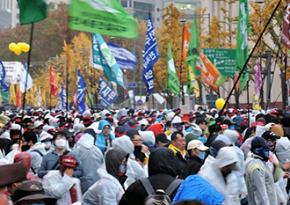Struggle in the streets of Seoul
reports from South Korea on this year's renewal of radical protests.
MORE THAN 100,000 people took to the streets of Seoul November 14 in South Korea's largest demonstration since 2008. The protesters were opposing the government's neoliberal program and called for the resignation of conservative President Park Geun-hye.
Thousands of buses from around the country converged on the nation's capital, bringing protesters who represented 53 different organizations. Organizers of the demonstration included the main labor federation, the Korean Confederation of Trade Unions (KCTU), several farmers' unions and the Labor Party, among many other groups.
After a rally, protesters marched to the Blue House where the president's offices are located. They were met by large numbers of riot police armed with water cannons that sprayed a liquid laced with pepper spray. Police buses illegally blocked the street, leading to a clash between demonstrators and the cops, with more than 50 protesters arrested. Aggression from the police extended to a nearby subway station, which was closed for the remainder of the day.

Among the 30 protesters and 110 police officers injured was Baek Nam-gi, a 69-year-old farmer who remains in critical condition after he was knocked unconscious by the water cannons. Forty years earlier, the farmer had protested against President Park's father, the dictator Park Chung-hee, who ruled from 1961 until he was assassinated in 1979.
Now, the government is vowing a crackdown against any further "violent" protests. Officials say they will use video footage of the protests to identify protesters, including union leaders, so they can be arrested and charged.
THERE ARE a range of political issues that motivated the big turnout on November 14.
The government's proposals for "reforming" labor laws are high on the list. Park's administration wants to make the Korean labor market more "flexible"--which, in reality, means giving companies more freedom to fire employees at will, base wages on "merit" instead of seniority and employ more temporary workers working irregular hours, without the protect of a contract or a union.
Another burning issue is the government's plan to require schools to use a single government-approved history textbook, rather than the books currently available from eight different companies. Park's conservative government ludicrously claims that current textbooks promote North Korean ideology and are too critical of the South Korean government--and that the new books would foster national unity.
Opponents of the government say the new textbook would actually glorify previous dictators such as Park Chung-hee, defend the right-wingers who collaborated with the Japanese occupation in the years leading up to the Second World War, and cover up human rights violations from that era.
2015 has seen a growing number of protests for the labor movement in Korea. The first demonstration in April drew 10,000 people to defend labor rights and demand justice in the case of the Sewol ferry sinking, which killed 300 people the previous April. One week later, May Day protests lasted two days and continued the struggle for labor rights.
Immediately after May Day, union leaders scheduled the demonstration for six months later. Activists chose mid-November 14 because it is a traditional activist anniversary to memorialize of workers' rights activist Jeon Tae-il, who died by self-immolation on November 13, 1970, in a protest against terrible conditions in Korean sweatshops. This act helped catapult the youth labor movement.
Despite the government's threats of repression, the struggle will continue. Next month, workers in several auto factories are planning to go on strike against the use of temporary workers. Member unions of the labor federation are deciding whether to join the strike in solidarity.


